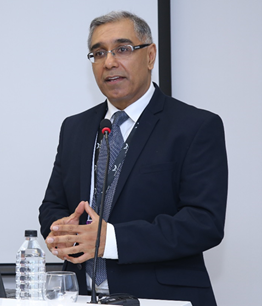Message from the Director
The Africa Training Institute continues its mission to contribute to improved macroeconomic and financial policies through high-quality training, which supports sustainable economic growth and poverty reduction in sub-Saharan Africa.
Building institutions and the capacity of officials across the region is even more important following the huge economic dislocation created by the pandemic, the war in Ukraine, and heightened geo-political fragmentation. Since 2013, ATI has endeavored to enhance the capacity development of its 45 member countries and has trained more than 6,000 government officials.
It's a major responsibility to be joining this Institute in Sept 2022. More than in any other region, ATI member countries are suffering from serious macroeconomic challenges— record high debt levels and little fiscal space, multi-decade inflation highs, tighter financing conditions, and capital flow disruptions. At the same time, in sub-Saharan Africa we see frequent, intense, and costly climate-related disasters, higher food and energy insecurity, and rising inequality. In response, member countries need to continue reforms that enhance resilience to these shocks.
The work delivered at ATI aims to build the capacity to do exactly this. Specifically, the Fund and by extension, ATI, is responding following recently approved strategies on addressing climate change; on fragile and conflict affected states (FCS); on mainstreaming gender; and on digital money. We will ensure that we respond flexibly and in a timely manner to support the many institutions that we work with across the region. At the same time, with large excess demand for our training courses, we will need to prioritize and continue to focus on directing our support where it has greatest impact.
The COVID pandemic led to changes in needs and priorities from ATI’s members and created opportunities for the IMF to develop and refine innovative approaches to ways of delivering CD. I’m pleased to say that the Institute adapted rapidly to these demands. A large volume of training and peer-to-peer learning has been organized over the past two years using various modalities such as in-person training, virtual training, hybrid training, blended training, webinars, peer learning and collaborative events with other IMF training centers, and in-country customized training. As the restrictions of the pandemic subside, we look forward to welcoming more officials in person to ATI while continuing to leverage the excellent opportunities to convene policymakers offered by virtual engagements.
As new challenges emerge, the Institute is striving to offer training in new areas such as climate change, good governance, digitization, gender equality while at the same time enhancing our curriculum in the traditional areas such as general macroeconomic analysis, financial sector issues, fiscal policy, monetary, exchange and capital account policies as well and inclusive growth and structural policies. Recognizing the priority of work on climate and macroeconomics and the huge demands in this area, ATI has recently hired a dedicated expert to develop a capacity development program in this area. We will also endeavor to build on efforts to increase the share of participants from fragile and conflict affected states and female participants. ATI will also be focusing more of its resources to technical assistance as a complement to traditional classroom training.
This is also an opportunity to recognize the financial contributions of our many development partners - China, European Investment Bank and Germany, including our host, Mauritius. Over recent years, it is extremely encouraging to see the strong ownership of ATI by sub-Saharan African countries being reflected in increasing member country contributions to the Center. The contributions of Ghana, Malawi, Nigeria, South Africa, Zambia and Zimbabwe is hugely appreciated and we look forward to more ATI members supporting the financial sustainability of the Institute as it helps them tackle critical macroeconomic policy challenges.
Working closely with IMF HQ and our network of Regional Capacity Development Centers across sub-Saharan Africa and beyond, we look forward to supporting the region navigate the many macroeconomic challenges it faces by building strong institutions. I look forward to working together with member countries, development partners, and civil society toward this critical goal.
Sukhwinder Singh

